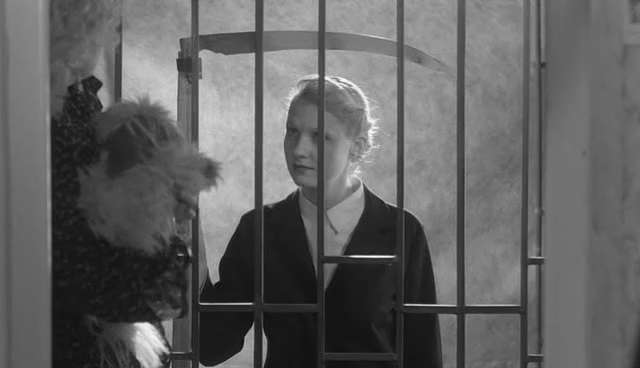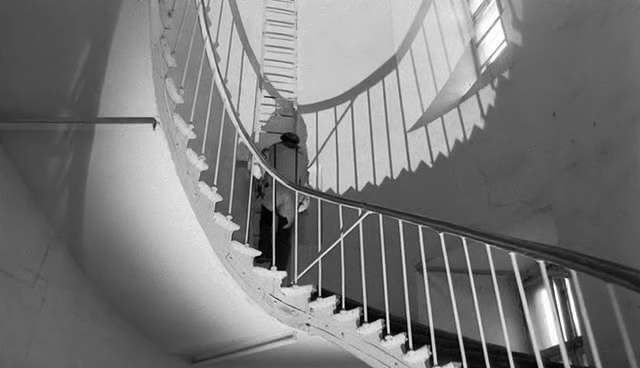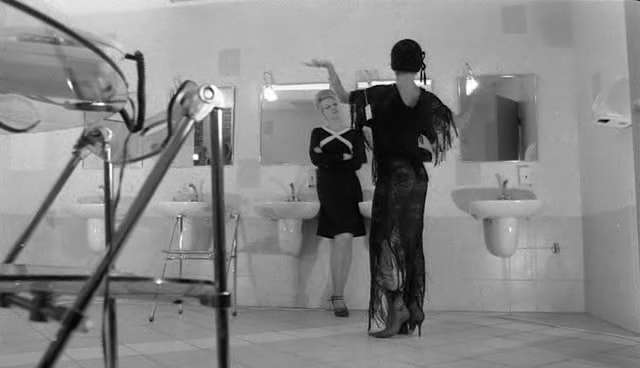
from review @ Kinokultura:
At the heart of Kira Muratova’s newest film, The Tuner (Nastroishchik, 2004), is her characteristic and enduring love of predation—predation for its own sake. Of course, any talk of “the heart of Muratova’s work” is a judgment of anatomy rather than sentiment, as any admirer would attest. With The Tuner, she has produced an extraordinary new film that offers a complex assessment of the human subject, civilization, and the creative act.
As those who follow Muratova will know, and as she herself has commented, her work divides into two categories: the plotless and the plotted. The plotless, a rarer category, arguably includes Asthenic Syndrome and Passions. Among the plotted films are the two early, provincial melodramas, as well as Sentimental Policeman, Three Stories, and Chekhovian Motifs. Muratova’s latest work, The Tuner, continues this dominant, plotted lineage, one that is more merciful to her audience.
Of course, to expect consistency from Muratova is to reveal an unfamiliarity with her work; at the same time, it is reasonable to speculate that the shift we are seeing is one marked by a certain uncharacteristic minimalist range—a sustained plot line; black-and-white composition; a limited set of devices; a recurring troupe of known actors—that balances the stochastic quality of her unpredictable logic. This minimalism—a relative category, of course, with respect to a highly mannered and ornamental cinema—permits the viewer more conceptual freedom, more autonomy to observe the larger connections through work that is markedly less cluttered than even her previous film. The insistent, aural repetition so closely associated with her cinema has been exhausted and is blessedly set aside, the dolls are gone, yet the same, inexhaustible curiosity about the elusive human subject continues in her scattered and associative logic.
Muratova’s tight and intricate narrative is punctuated by familiar cinematic devices, red herrings, and pranks immediately identifiable—even beyond cinema production—with Muratova’s sui generic style. I will mention three: first, her inclusion of a “cultural intermezzo” by an amateur artist-enthusiast. Aficionados of Muratova’s work will remember this device, most memorably Aleksandra Svenskaia’s trumpet solo performance of “Strangers in the Night” in Asthenic Syndrome (Astenicheskii sindrom, 1989) and declamatory lyrics by the amateur poet, Gena (Leonid Kushnir), from “Boiler Room No. 6,” the first novella of Three Stories (Tri istorii, 1997). In The Tuner, this device takes the form of a girl singer-songwriter performing on public transport and a number of other charmingly inept musicians (a clarinetist, two tuba players, random, elderly singers, and Andrei’s spontaneous “Uzbek” improvisation). This is the utopian dimension of Muratova’s creative act: irredeemably unprofessional, yet utterly complete, self-sufficient in itself, the flawless conjuration of an inner hallucination.
A second kind of stylistic punctuation is Muratova’s episodic, anonymous eccentrics, who can be traced from the nameless old man at the roadside café (Brief Encounters), whose children had been killed by the fascists; to the nameless old man in the post office (Long Farewells), who dictates a telegram to his children; to the nameless young man whose strict mother would not admit him after 11.00 pm (Sentimental Policeman [Chuvstvitel'nyi militsioner, 1992]); to the disapproving, nameless neighbor-woman of “Ophelia” (the second novella of Three Stories), who repetitively intones “There is no toilet here” [“zdes' net tualeta”]. These figures, like the rapturous amateur artists described above, are also allocated their cameo roles in The Tuner: a deaf-mute, retarded woman, fed by Lina; a toga-clad wine-seller, who offers rosé for free; a rowdy, but harmless neighbor boy who harasses Andrei; a nameless blind man who is granted the film’s final lines. When we were younger, we might have mistaken these vignettes as evidence of a certain redemptive pathos in Muratova’s work; now retrospectively, we observe them with cooler eyes as minor sightings in Muratova’s game preserve of the human species. The deaf-mute of The Tuner is an amusing freak, no more or less a child of the universe than the “homicido-philiac” Litvinova.
A third recognizable decoration is Muratova’s fascination with doubles, twins, and buddies: the reader might remember Vera and Zoia from Getting to Know the Wide World (Poznavaia belyi svet, 1979); Liliia and Violetta (Passions [Uvlechen'ia, 1994]); the two Mashas (Asthenic Syndrome); El'vira and Al'bina in the novella “Ophelia” (Three Stories). Just as we think that this decorative line must have been discarded, two sets of twins make their appearance at the very end of The Tuner.
One could continue the list of stylistic trademarks—the soundtrack’s buzzing fly (repeated here from Long Farewells, Passions, and “Little Girl and Death,” the third novella of Three Stories); the special status of animals (echoed here from Asthenic Syndrome, Passions, and elsewhere)—but the larger function of the orchestrated repetitions is of greater interest here: these stable and recurrent elements assure us that we are indeed watching the same, gifted madwoman, for whom these eccentric “passions” have become the cinematic norm. It is against these now familiar devices that Muratova contrapuntally develops her new rhapsody on the human condition. The current rhapsody is markedly more restrained, selective, and (dare I utter the word?) disciplined than her earlier work.





http://www.nitroflare.com/view/AB0340FD7511B53/Nastroyshchik_%282004%29-Kira_Muratova_CD1.avi
http://www.nitroflare.com/view/5F1B6A79BC0D77A/Nastroyshchik_%282004%29-Kira_Muratova_CD1.en.srt
http://www.nitroflare.com/view/C32606EA0C4E5CC/Nastroyshchik_%282004%29-Kira_Muratova_CD2.avi
http://www.nitroflare.com/view/7F04D581D93228A/Nastroyshchik_%282004%29-Kira_Muratova_CD2.en.srt
Language:Russian
Subtitles:English .srt